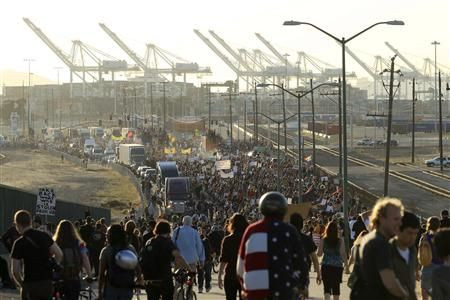Occupy Protesters Shut Down Port of Oakland

Protesters shut down operations at Oakland's port and blocked traffic Wednesday in demonstrations against economic inequality and police brutality that were marred by scattered vandalism.
The protest by some 5,000 people fell short of the intended general strike paralyzing the northern California city that was catapulted to the forefront of national anti-Wall Street protests after a former Marine was badly wounded during a march and rally last week.
But as evening fell, an official said maritime operations at the Oakland port, which handles about $39 billion a year in imports and exports, had been effectively shut down.
Maritime operations are effectively shut down at the Port of Oakland. Maritime area operations will resume when it is safe and secure to do so, the port said in a statement.
Port spokesman Isaac Kos-Read said, however, that some activity may continue at the port, which was typically slower in the evening than during the day.
Protesters, who streamed across a freeway overpass to gather in front of the port gates, stood atop tractor-trailers stopped in the middle of the street.
Others climbed onto scaffolding over railroad tracks as a band played a version of the Led Zeppelin song Whole Lotta Love, using amplifiers powered by stationary bike generators.
The reason I'm here is, I'm sick and tired of trying to figure out where I should put my vote between the lesser of two evils, student Sarah Daniel, 28, said at the port.
Police said a pedestrian, identified by local media as a protester, was struck by a vehicle in downtown Oakland and taken to a local hospital. The extent of the person's injuries was unknown.
The anti-Wall Street activists, who complain bitterly about a financial system they believe benefits mainly corporations and the wealthy, had aimed to disrupt commerce with a special focus on banks and other symbols of corporate America.
Other than the port and several downtown Oakland bank branches and stores that closed, schools and most businesses remained open and commerce largely carried on as usual.
The demonstrations centered at Frank Ogawa Plaza adjacent to City Hall, scene of a tug-of-war last week between police who cleared an Occupy Oakland encampment there and protesters who sought to return, and ultimately succeeded in doing so.
Protesters also blocked the downtown intersection of 14th street and Broadway, where ex-Marine Scott Olsen was wounded during a clash with police on the night of Oct. 25.
Windows were smashed at several Oakland banks and a Whole Foods market, with pictures of the damage posted on Twitter.
Acting Police Chief Howard Jordan said a group of 60 to 70 people he described as anarchists were responsible for the damage while the bulk of the protesters were peaceful.
PROTESTS IN SEATTLE, LOS ANGELES
Few uniformed police officers were spotted at the rallies, but Jordan said that demonstrators would not be allowed to march beyond the gates of the port.
Local labor leaders, while generally sympathetic to the protesters, said their contracts prohibited them from proclaiming an official strike. Craig Merrilees, a spokesman for the International Longshore and Warehouse Union, said about 40 of 325 unionized port workers had stayed off the job.
Port employees were sent home at 3:30 p.m., the port spokesman Kos-Read said, ahead of the planned port march.
Oakland Unified School District spokesman Troy Flint said more than 300 teachers stayed home, most of those having made formal requests the night before.
We did have to scramble a little bit to cover the extra absences, Flint said, adding that some classes were combined but that no students were left unsupervised.
Other residents like Rebecca Leung, 33, who works at an architectural lighting sales company, went about their ordinary activities. Leung said she generally supported the protests.
I don't really feel striking is necessary. I work for a small company, I don't work for Bank of America, she said.
The owner of a flower shop near the plaza, meanwhile, said that the weeks of noisy rallies and ongoing encampment had only served to hurt his small business.
Business has not been the same. Everything has gone downhill around here, the noise, the ambience and the customers, the man, who identified himself as Usoro, told Reuters. I can't afford to close down.
It was the wounding of Olsen, a former Marine turned peace activist who suffered a serious head injury during protests last week, that seemed to galvanize protesters and broadened their complaints to include police brutality.
He remains in an Oakland hospital in fair condition.
Protest organizers say Olsen, 24, was struck by a tear gas canister fired by police. Acting Police Chief Jordan opened an investigation into the incident but has not said how he believes Olsen was wounded.
Elsewhere, New York City Mayor Michael Bloomberg told Wall Street protesters he would take action if circumstances warranted, saying that the encampments and demonstrations were really hurting small businesses and families.
In downtown Seattle, about 300 rain-soaked protesters blocked the street outside the Sheraton hotel where Jamie Dimon, chief executive of the biggest U.S. bank, JPMorgan Chase & Co, was scheduled to speak at an event organized by the University of Washington's school of business.
Earlier in the day, five protesters were arrested for trespassing after chaining themselves to fixtures inside a Chase bank branch, the Seattle Police Department said.
In Los Angeles, several hundred protesters marched through downtown in solidarity with their Oakland counterparts, while in Virginia, protesters sought alarm whistles at their encampment in a public park in Charlottesville because women were concerned about their safety overnight.
You're seeing people who don't really care about the Occupy movement, who are doing their own thing, Zac Fabian, a spokesman for Occupy Charlottesville, said.
(Additional reporting by Dan Whitcomb, Mary Slosson, Emmett Berg, Matthew Ward and Bill Rigby; Writing by Dan Whitcomb; Editing by Jerry Norton and Cynthia Johnston)
© Copyright Thomson Reuters 2024. All rights reserved.





















